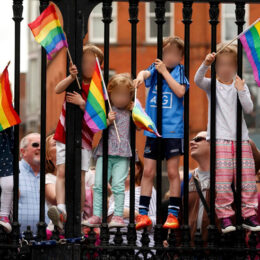Washington Post Sudarsan Raghavan June 5, 2006
Every morning, Jackie Avelar wakes up to a predicament. On one side of her bed is a clock that sounds the Islamic call to prayer five times a day. On the other side is a statue of Mary. As a Muslim, she wants to remove it. As a Latina, she can’t.
Her father, who is a Catholic from El Salvador, wants the statue to stay.
“I have to respect him,” Avelar said.
So she has found a comfortable balance: She covers the statue with a photo of her family.




She converted to Islam, it seems, because she found no authenticity or asceticism in the Catholic Church. Of course, the nominalism she experienced in the Catholic Church is also present in Islam as it is in any faith. Her reaction to it will be interesting when she acutally encounters it.
The lesson to we Christians is clear, we have to both teach and live the faith. Priests have to be prepared to explain not just dogmatize. Monasticism needs to be more visibly supported by the hierarchy. We must not allow nominalism to overtake our own lives.
It is a sad comment of Latino culture if this woman finds more respect for women in Islam than in her native culture.
Well said Michael. Nature abhors a vacumn. If the missionary spirit of our Churches has become so atrophied that we cannot even communicate Christian beliefs and values to our own children with any degree of enthusiasm, then the future looks bleak. Today, in the Greek daily Ekatherimini there are several articles about the national soul-searching following the murder of an 11-year old boy by his classmates. How could this happen, the article asks, have we become that morally bankrupt?
When I was growing up Greek Orthodox Priests often didn’t even bother to give their sermons in English, or if they did, it was often dull and forgetable. As result, one thing that immediately impressed me when I encountered Protestantism, was the power and importance placed on preaching the Gospel. I am very fortunate now to have a Greek Orthodox Priest who works hard on his sermons and views them as an important opportunity to impart insights about the value of our faith. It makes a great difference.
The musty, somnolent European churches appear to be in urgent need of new leadership infused with the misssionary spirit of the first apostles and determined to reinvigorate the faithful. All churches must recognize that communication is a vital and essential component of their work
Michael I wouldn’t be quick to place the failings on the actions of Roman Catholics, clergy or laity.
The article is incomplete in that it’s one-sided. The descriptions of the religious discussions are from the converts’ perspective. Meaning their comments are made to justify their actions.
Further in the article there is this mention of a Islamic convert being exposed to Islam through course instruction. Who knows what happened in this course of instruction? If the course was like much of academia today — propaganda and ideology — it was more indoctrination than instruction. Were they rebellious before Islamic conversion and does this action continue a rebellious nature? There are to many unanswered questions about their actions before their conversion to automatically assume a failure in Catholicism.
Also keep in the mind, these women are portrayed as “victims”. Victims of their culture because they’re not readily accepted by the community. The underlying text of this article is Roman Catholicism failed them so they moved to Islam. And their families should accept them. It’s the typical syncretic approach toward religion that many secularists in the media believe. Look at the continual repetitive comment through the article about how before she drank and danced. Now she has respect and lives a better life. So it doesn’t matter to secularist what one believes because it all comes down to civil morality.
My question would be is how dedicated to Islam would these women be if they had to live the life in an Islamic country? As converts in America they still have a certain amount of safeguards the prevent them from experiencing full Islam.
JBL, you miss construe my comments. I did intend to slam the Roman Catholic Church or to imply that all Roman Catholics are inauthentic, or that there was no aceticism in the Catholic Church merely that this woman did not find it. Although I have personally heard quite a few RC priests give condesending, dogmatizing answers to people who were asking genuine questions I have seen the same attitude in some Orthodox priests as well. Fortunately, I did not meet that attitude when I approached the Orthodox Church or I might not be Orthodox today. I am sure this lady did not look very hard and her question may not have been a genuine question. It may be that no matter what the priest had to say about the Holy Trinity, she would not have accepted it, her mind already made up.
I suspect that the action she took has as much to do with her family as it does with the Church. She evidently has found a warm, comforting, safe place in which to live. She fails to take into account that had she walked by the laborers in modest western dress with an attidude of modesty, she might have not gotten the reaction she did. If, prior to her conversion, she wore less than modest western clothes and walked by the laborers with the attitude of a salsa babe, the reactions she got are regretable, but not surprising. She also fails to realize that a simplistic approach to God is not the same as simplicity.
All that being said, there was a need that was not met for her. All of us need to realize that the questions she says she asked and the attitudes she reports to have encountered do exist and they do make a difference in the the communication of the faith. All that she says she was looking for and more are in the the Roman Catholic Church, the answers are in the Orthodox Church too, they are even in much of Protestanism. In order to counter Islamic claims, we have to live more authentic Christian lives and be better prepared to answer genuine questions in meaningful ways. The message of simple devotion and ascetic living is powerful to many people irrespective of the package surrounding that message that usually remains unseen and unexplored.